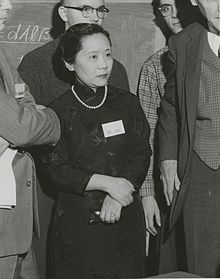Chien Shiung Wu
ChienShiung Wu was a Chinese American experimental physicist who made significant contributions in the field of nuclear physics. Wu worked on the Manhattan Project, where she helped develop the process for separating uranium metal into uranium235 and uranium238 isotopes by gaseous diffusion. She is best known for conducting the Wu experiment, which contradicted the hypothetical law of conservation of parity. This discovery resulted in her colleagues TsungDao Lee and ChenNing Yang winning the 1957 Nobel Prize in physics, and also earned Wu the inaugural Wolf Prize in Physics in 1978. Her expertise in experimental physics evoked comparisons to Marie Curie. Her nicknames include the First Lady of Physics, the Chinese Madame Curie, and the Queen of Nuclear Research.
ChienShiung Wu was born in the town of Liuhe in Taicang, Jiangsu province, China, on May 31, 1912, the second of three children of Wu ZhongYi and Fan FuHua. The family custom was that children of this generation had Chien as the first character of their forename, followed by the characters in the phrase YingShiungHaoJie, which means heroes and outstanding figures. Accordingly, she had an older brother, ChienYing, and a younger brother, ChienHao. Wu and her father were extremely close and he encouraged her interests passionately, creating an environment where she was surrounded by books, magazines, and newspapers.
Source: Wikipedia

